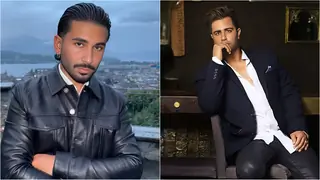Posted:
A new language is emerging in all fields of cinema
Inventive and stylish, Jaideep Sahni is among the most interesting young lyricists and scriptwriters of Bollywood. A former computer engineer, he wrote lyrics for films like 'Chak De! India' and 'Khosla Ka Ghosla'. He speaks to Avijit Ghosh:
The new Hindi film songwriter is trying to discover his own language to match the mood of the times. What is your view?
From themes to screenplays, from dialogues to music and lyrics, all across a new language is emerging. Across all sections of our lives, in all professions, a hybrid expression is emerging, which gets reflected in the current lyrics or even scripts through every individual writer's perspective. There is a lot more discussion and debate about form and aesthetics as a new language tries to find its feet.
There's a lot of churning going on because the audience, like the country, is getting polarised economically, socially, aesthetically faster than anybody can keep pace with. The earlier understanding of demographics and the psychographics of the audience have gone for a toss. It's a bit like discovering a new territory, right inside your own home!
What is the difference between writing poetry and film songs?
Unlike poetry which you do for your own self, writing film lyrics is a peculiar artistic enterprise bound by many constraints that require conscious or unconscious choices to make: poetry or not, pure language or hybrid, literary or street, classic or contemporary, mukhda-antara or free verse. Film lyricists have always worked like this, surrounded by a hundred constraints binding them and having to deliver on time. This has been the charm and the reason of existence of this strange and unique profession that exists nowhere else in the world but only in South Asia.
Many modern Hindi film songwriters want to do more than just write songs. They are writing scripts and they want to direct films.
That's because of the turmoil in the music business. The very nature of what we always understood to be a song has been under a lot of pressure. Technology has suddenly changed the way people buy and listen to songs. Due to piracy, music sales plummeted.
As films face the pressure to shift from being stories well told to fast moving consumer products, songs too start facing the pressure to being reduced to ad jingles or a ring tone. Of course in the middle of all this, lyricists have been coming up with work which rises above the rubbish. That's the beauty and unpredictability of this craft or art or whatever you want to call it.
It is very difficult for lyricists to do what they'd really like to do. It's a profession under tremendous pressure right now, and people are not really sure it can give them the creative satisfaction they long for. So they try their hand at other things, and why not.
From themes to screenplays, from dialogues to music and lyrics, all across a new language is emerging. Across all sections of our lives, in all professions, a hybrid expression is emerging, which gets reflected in the current lyrics or even scripts through every individual writer's perspective. There is a lot more discussion and debate about form and aesthetics as a new language tries to find its feet.
There's a lot of churning going on because the audience, like the country, is getting polarised economically, socially, aesthetically faster than anybody can keep pace with. The earlier understanding of demographics and the psychographics of the audience have gone for a toss. It's a bit like discovering a new territory, right inside your own home!
What is the difference between writing poetry and film songs?
Unlike poetry which you do for your own self, writing film lyrics is a peculiar artistic enterprise bound by many constraints that require conscious or unconscious choices to make: poetry or not, pure language or hybrid, literary or street, classic or contemporary, mukhda-antara or free verse. Film lyricists have always worked like this, surrounded by a hundred constraints binding them and having to deliver on time. This has been the charm and the reason of existence of this strange and unique profession that exists nowhere else in the world but only in South Asia.
Many modern Hindi film songwriters want to do more than just write songs. They are writing scripts and they want to direct films.
That's because of the turmoil in the music business. The very nature of what we always understood to be a song has been under a lot of pressure. Technology has suddenly changed the way people buy and listen to songs. Due to piracy, music sales plummeted.
As films face the pressure to shift from being stories well told to fast moving consumer products, songs too start facing the pressure to being reduced to ad jingles or a ring tone. Of course in the middle of all this, lyricists have been coming up with work which rises above the rubbish. That's the beauty and unpredictability of this craft or art or whatever you want to call it.
It is very difficult for lyricists to do what they'd really like to do. It's a profession under tremendous pressure right now, and people are not really sure it can give them the creative satisfaction they long for. So they try their hand at other things, and why not.



















